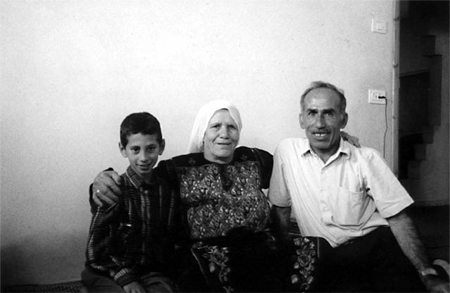
Umm 'Afif Ghatasha with her son and grandson. Fawar Camp (Hebron district) June 1998.
|
 Umm 'Afif Ghatasha with her son and grandson. Fawar Camp (Hebron district) June 1998. |
| Umm 'Afif Ghatasha, Fawar camp, June 5:
|
|
'Afif Ghatasha wants me to meet his family, especially his mother, so after I finish recording and photographing Hajji Fatima, he drives me to Fawar camp, beyond Hebron. It's my first sight of Hebron. It's more industrialized than I expected - we pass several factories - but Fawar camp is on a hill, and surrounded by hills, unpromisingly rocky. Yet in this camp most households have bits of garden where they grow fruit, vegetables and herbs. People are poor because there is so little employment in the Hebron area. But at least they can supplement their diet in a way that is impossible in the more crowded urban camps.
The Ghatasha family are also from Beit Jibrin. 'Afif tells me that Beit Jibrin people don't only live in the camp of that name, but are scattered in several West Bank camps, as well as in Jordan and Syria. Perhaps because of its position in central Palestine, some of its people speak with the characteristic southern dialect, using 'ch' for 'k', while others use the northern form which is closer to the Arabic spoken in Lebanon and Syria. Umm 'Afif speaks with the 'ch'. In fact her Arabic is so different from what I am used to that I understand very little on first hearing. She is a tall powerful-looking woman, and it's easy to believe that she built up the poultry business that enabled her to give her sons a good education. She was newly married with a four-month old son ('Afif) when the Israelis attacked Beit Jibrin in 1948. Her expulsion story is one of the most unforgettable of all I have heard: the days of bombing of the village; her feeling of being torn between her husband's family who left and her own family who stayed; how her husband went back to retrieve food, and was killed by a booby-trap; how her mother-in-law took a camel to bring his body for burial; how they lived in the open for months, then in tents, then eventually built a shack on the edge of Fawar |
camp. Early days in Fawar were miserable - "We went barefoot, we were hungry". Whole families would work in agricultural labour at a rate of a shilling a day (1/20 of a Jordanian dinar). She was a young widow, so there was a struggle between the two families over whom she should marry. She also told about the time when 'Afif was arrested, and she went from prison to prison searching for him. But all her ten children are educated.
Strictly speaking I should not have allowed Umm 'Afif into my sample, since she had been displaced only once, in 1948; her home in Fawar had not been demolished or threatened with demolition. But I think her expulsion story is too remarkable to be excluded.
Umm 'Afif Ghatasha speaks: |
[Hajji Fatima Da'jen] [Umm Kassem al-Azrak] Copyright©2005 |
|